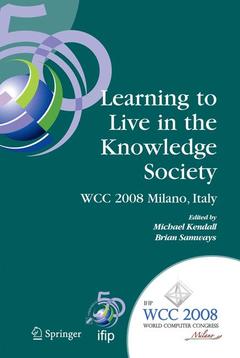ED-L2L, Learning to Live in the Knowledge Society, is one of the co-located conferences of the 20th World Computer Congress (WCC2008). The event is organized under the auspices of IFIP (International Federation for Information Processing) and is to be held in Milan from 7th to 10th September 2008. ED-L2L is devoted to themes related to ICT for education in the knowledge society. It provides an international forum for professionals from all continents to discuss research and practice in ICT and education. The event brings together educators, researchers, policy makers, curriculum designers, teacher educators, members of academia, teachers and content producers. ED-L2L is organised by the IFIP Technical Committee 3, Education, with the support of the Institute for Educational Technology, part of the National Research Council of Italy. The Institute is devoted to the study of educational innovation brought about through the use of ICT. Submissions to ED-L2L are published in this conference book. The published papers are devoted to the published conference themes: Developing digital literacy for the knowledge society: information problem solving, creating, capturing and transferring knowledge, commitment to lifelong learning Teaching and learning in the knowledge society, playful and fun learning at home and in the school New models, processes and systems for formal and informal learning environments and organisations Developing a collective intelligence, learning together and sharing knowledge ICT issues in education - ethics, equality, inclusion and parental role Educating ICT professionals for the global knowledge society Managing the transition to the knowledge society

